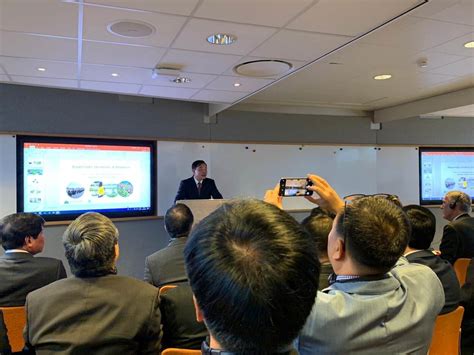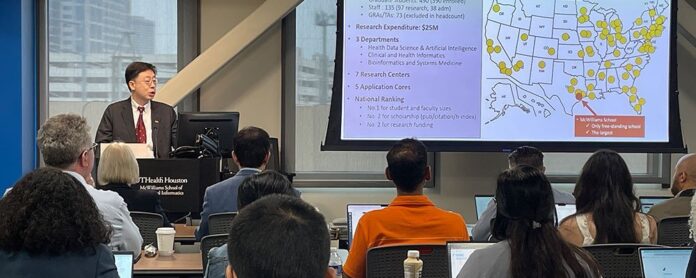In recent years, the intersection of bioinformatics and biomedical research has led to groundbreaking advances that are revolutionizing healthcare. As technology rapidly evolves, bioinformatics is playing a pivotal role in analyzing complex biological data, enabling researchers to make significant strides in understanding diseases at the molecular level. This article explores the current trends and key technologies driving this transformation, including the latest breakthroughs in genomic sequencing and the integration of artificial intelligence. By delving into real-world applications like personalized medicine and highlighting international collaborative efforts, we aim to shed light on the future prospects and ethical considerations that will shape the next era of biomedical innovation.
Let’s investigate this topic extensively with tirfblog.com
1. Current Trends in Bioinformatics
Bioinformatics has become a crucial foundation for modern biomedical research, fueled by the rapid increase in biological data and the need for advanced analysis tools. The current emphasis on big data analytics enables scientists to process massive amounts of genetic, proteomic, and metabolomic data. Cloud computing further accelerates these capabilities by providing scalable resources for data storage and processing. A significant trend is the integration of multi-omics approaches, where data from different biological layers, such as genomics, transcriptomics, and proteomics, are combined to offer a more holistic understanding of biological systems. Furthermore, the application of machine learning algorithms in bioinformatics is revolutionizing the prediction and modeling of complex biological processes, enhancing our capacity to identify potential therapeutic targets and understand disease mechanisms. These trends underscore the dynamic and rapidly evolving nature of bioinformatics, placing it at the forefront of biomedical advancements.

2. Key Technologies Driving Biomedical Research
Advanced technologies are revolutionizing biomedical research, leading to new ways of understanding and treating diseases. A key driver of this progress is high-throughput sequencing technologies, like next-generation sequencing (NGS). These technologies enable rapid and cost-effective analysis of entire genomes, providing unparalleled insights into genetic variations and their connection to disease.
CRISPR-Cas9, a revolutionary gene-editing technology, allows for targeted DNA modifications, holding promise for treating genetic diseases and fostering personalized medicine. Concurrently, breakthroughs in imaging technology, such as cryo-electron microscopy, provide scientists with highly detailed views of molecular structures, facilitating drug development and unraveling complex biological processes.
Artificial intelligence (AI) and machine learning are revolutionizing biomedical research, particularly in analyzing vast datasets, predicting disease outcomes, and identifying novel drug targets. These technologies are becoming integral to every phase of the research process, from initial discovery to clinical trials, leading to a significant acceleration in the pace of scientific advancements.
Furthermore, progress in biobanking and the adoption of wearable health devices are bolstering data collection and real-time patient monitoring, enabling more personalized and prompt interventions. Collectively, these technologies are transforming the field of biomedical research, fostering innovation and paving the way for novel treatment and prevention strategies.

3. Breakthroughs in Genomic Sequencing and Analysis
Advances in genomic sequencing and analysis have significantly expanded our comprehension of the genetic underpinnings of diseases, ushering in an era of more precise and personalized healthcare. A key development has been the reduction in the cost and time needed to sequence the entire human genome, making genomic data more readily available to both researchers and clinicians. This accessibility has facilitated the discovery of numerous genetic markers linked to various diseases, enabling earlier and more accurate diagnoses.
A significant advancement in biomedical research is the emergence of single-cell sequencing technologies. These technologies allow scientists to analyze the genetic makeup of individual cells, revealing the diversity within cell populations and how this diversity contributes to disease progression, particularly in cancers. This level of detail, previously inaccessible, is now paving the way for the development of targeted therapies.
Combining genomic data with other biological information, such as proteomics and metabolomics, is deepening our knowledge of how genes interact with the environment and influence disease development. Sophisticated bioinformatics tools are now equipped to analyze these intricate datasets, leading to the identification of new biomarkers and potential therapeutic targets.
These advancements in genomic sequencing and analysis are not only propelling biomedical research forward but are also laying the foundation for

4. Impact of AI and Machine Learning on Biomedical Discoveries
Artificial intelligence (AI) and machine learning are transforming biomedical research. They empower researchers to analyze massive, complex datasets, revealing patterns and insights that were previously inaccessible to humans. These technologies are speeding up the pace of discovery, especially in fields like genomics, drug development, and disease prediction.
AI is revolutionizing drug discovery by leveraging machine learning algorithms to analyze vast datasets of chemical compounds. These algorithms can predict the potential efficacy and safety of new drugs, dramatically reducing the time and cost of identifying promising candidates. This profound impact is accelerating the pace of drug development.
Genomics is leveraging artificial intelligence (AI) to decipher the immense data generated by next-generation sequencing. Machine learning models are employed to identify genetic variations associated with diseases, aiding researchers in understanding the root causes of conditions like cancer and neurodegenerative disorders. Moreover, AI enhances the precision of predictive models, facilitating earlier detection and tailored treatment strategies for individuals.
Furthermore, AI-powered tools are employed to analyze medical images and electronic health records, enabling the early detection of diseases and the identification of individuals at high risk. With the ongoing advancement of AI and machine learning, their influence on biomedical discoveries is poised to expand, ushering in the next wave of innovation.
5. Real-World Applications in Personalized Medicine
Personalized medicine, powered by breakthroughs in bioinformatics and biomedical research, is revolutionizing disease diagnosis and treatment. By customizing medical care to each patient’s unique characteristics, personalized medicine delivers more accurate and effective healthcare solutions. A prime example is cancer treatment, where genomic profiling of tumors reveals specific mutations that can be targeted with precision therapies. This strategy not only enhances treatment outcomes but also minimizes side effects by eliminating the need for generic, one-size-fits-all approaches.
Another application lies in pharmacogenomics, where a patient’s genetic profile is used to predict their response to specific medications. This empowers healthcare providers to select the most effective drugs and dosages, minimizing adverse reactions and maximizing therapeutic outcomes. Furthermore, personalized medicine is playing a vital role in managing chronic diseases, with individualized treatment plans crafted based on a patient’s unique genetic, environmental, and lifestyle factors. These practical applications are making healthcare more effective and personalized.
6. Collaborative Efforts and International Research Projects
Bioinformatics and biomedical research are propelled forward by collaborative efforts and international research projects. These collaborations harness diverse expertise and resources, fostering the exchange of data, technologies, and insights across geographical boundaries. A prime example is the Human Genome Project, which established a benchmark for large-scale international cooperation in genomics. The project’s success has inspired numerous subsequent initiatives, such as the International Cancer Genome Consortium, which seeks to delineate the genetic mutations associated with various cancers.
Global biobanks, which gather and preserve biological samples from a variety of populations, represent another crucial area of collaboration. These biobanks are essential for investigating the genetic origins of diseases across diverse ethnicities, paving the way for more inclusive and effective medical treatments.
In addition, international collaborations are fostering the standardization of data formats and analytical tools. This makes it easier for researchers globally to work together and exchange their findings. Such collaborative efforts are crucial for addressing intricate global health challenges and expediting biomedical breakthroughs, ultimately contributing to better health outcomes worldwide.
7. Future Prospects and Ethical Considerations in Bioinformatics
Bioinformatics is poised to revolutionize biomedical research and healthcare in the future. Emerging technologies, like advanced AI algorithms and next-generation sequencing, promise to provide deeper insights into complex biological processes. This will enable more precise and personalized medical interventions. As bioinformatics continues to evolve, it will play a vital role in discovering new biomarkers, developing innovative therapies, and enhancing our understanding of diseases at the molecular level. This transformative potential makes bioinformatics a field with tremendous promise.
These advancements, however, also present significant ethical challenges. The abundance of sensitive genetic and health data generated requires strong safeguards to protect patient privacy and data security. Crucial concerns like informed consent, data ownership, and the potential for misusing genetic information must be addressed to foster public trust and uphold ethical research practices.
Furthermore, incorporating bioinformatics into clinical practice requires a cautious approach to prevent exacerbating existing health disparities. Equitable access to these technologies and mitigation of potential biases in data analysis are paramount to achieving equitable and inclusive healthcare outcomes. This necessitates a careful balance between innovation and ethical responsibility.
The advancements in bioinformatics and biomedical research are driving transformative changes in healthcare, from breakthroughs in genomic sequencing to the integration of AI in disease analysis. These innovations promise more personalized and effective treatments, reshaping our approach to medical care. However, as we advance, it is crucial to address the ethical considerations and ensure equitable access to these technologies. By balancing technological progress with ethical responsibility, we can harness the full potential of bioinformatics to improve health outcomes and advance the future of medicine.
tirfblog.com

